David Kennedy (1825-1886)
and his daughter, Marjory (Kennedy) Fraser
(1857-1930)
John Henderson writes
....
On Electric Scotland, I
came across this little poem about an entertaining Scottish Vocalist,
David Kennedy, and it aroused my curiosity.
'AN EPISTLE TO DAVID
KENNEDY' [1825-1886] OF PERTH, SCOTLAND
by
Ex-pat Scotsman - D.M. HENDERSON Esq. of Canada
Oh Kennedy, oh Davy man,
we want ye to come back —
We want to hae anither sang, anither couthie crack;
We were blithe when ye were wi' us, we are wae sin ye' re awa',
Hae pity on us, Kennedy—come, gie's anither ca' !
We want to hear the guid
auld sangs, that carry back the min'
To the faces, and the frien' ships, and the hame-scenes o' langsyne;
We want to hear the Doric braid, and lauch and greet by turns,
As ye sing the sangs o' Tannahill and oor ain brither Burns.
Ye'll bring the bairns a'
wi' ye—we maun hear sweet Helen's sang,
Like the liltin' o' the mavis the lowlands woods amang;
We maun hear wee Maggie's music, and see fair Marjory,
Wi' the ripple in her sweet voice, and the twinkle in her e'e !
Ye'll bring Johnny wi' his
fiddle—od, he plays it wi' sic skill,
That oor very e'en gang dancin', and oor feet'll no keep still;
And Robert, he'll be wi' ye, and thae grand war sangs he'll gie,
Till every Scot amang us is on en' to dae or dee.
Sae ye'll come back, Davy
Kennedy, and mak oor hearts rejoice,
Wi' your cheery face, your cantie ways, and the music o' your voice,
And if the warl' wad spare ye, we'd keep ye for a year,
And ye'd hae concerts nichtly, and we'd a' be there to hear !
The content of the poem
gave me enough clues to seek out and find the following book on
archive.org that told the life-story of 'Davy' through the eyes and pen
of one of his daughters who just happened to be the controversial
Edinburgh musicologist Marjory Kennedy-Fraser (1857-1930).
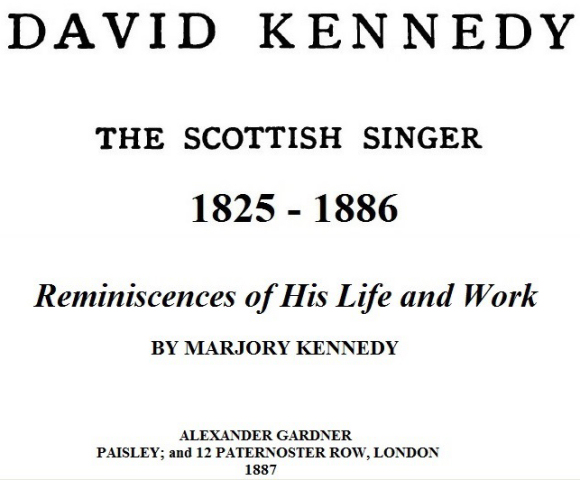
More about Marjory in due
course .... but firstly, here is Davy's genealogy and biography.
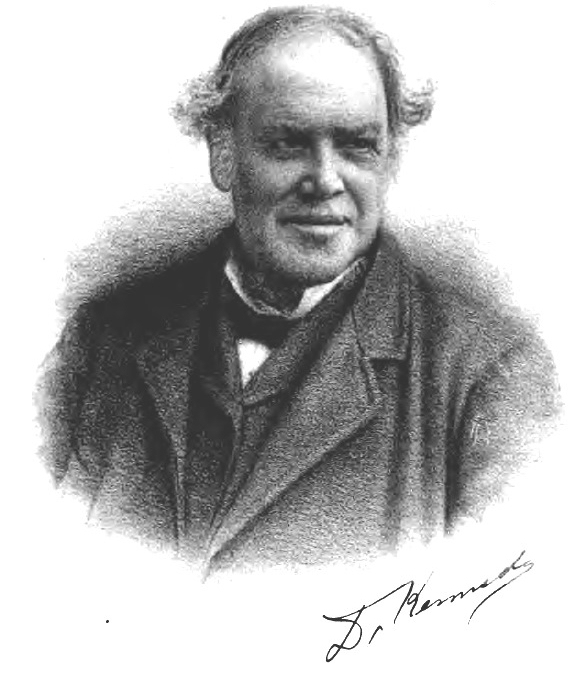
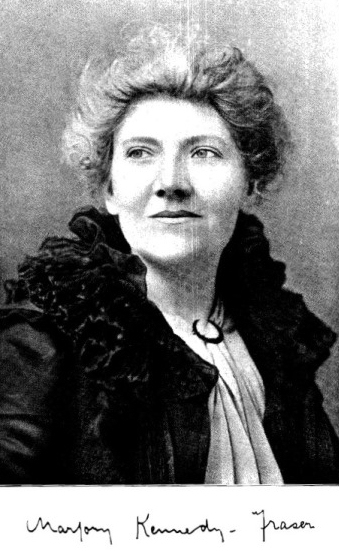

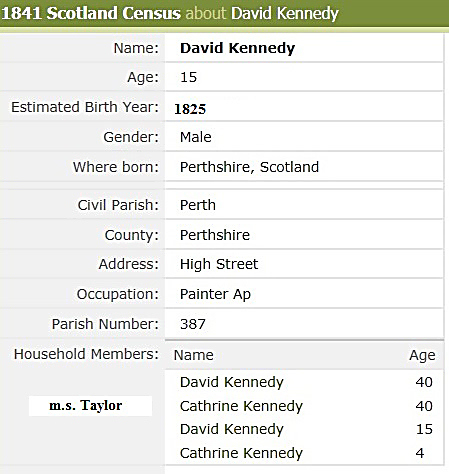
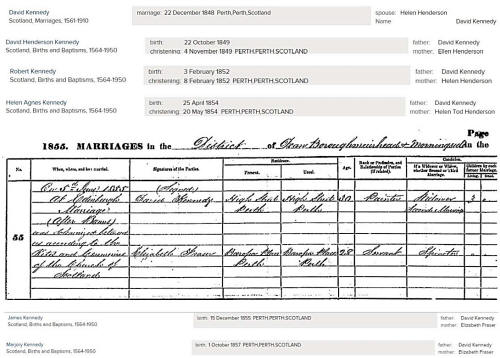
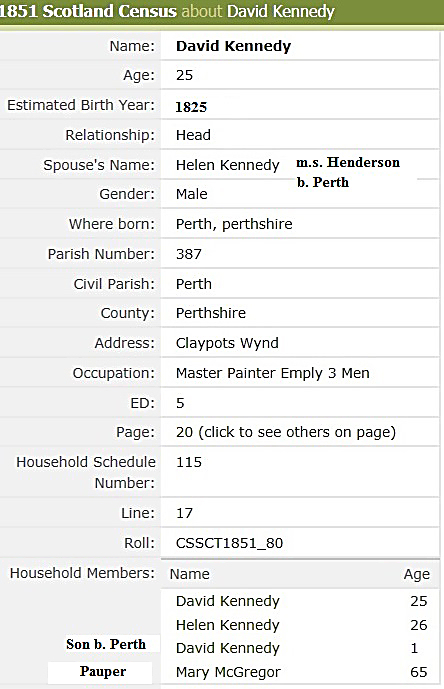
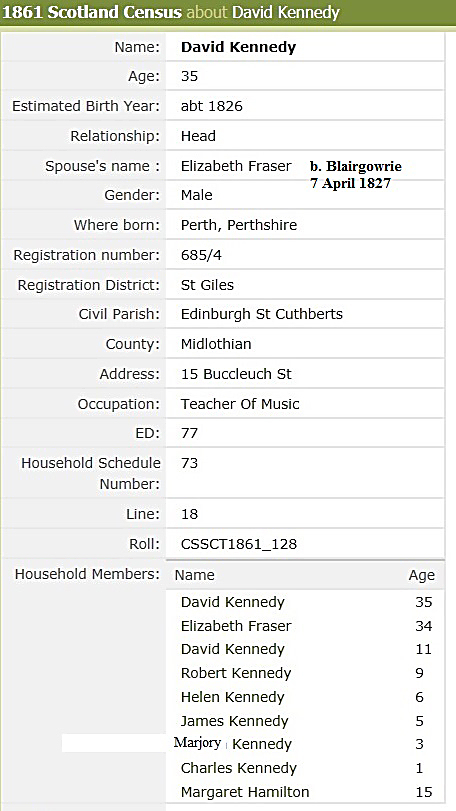
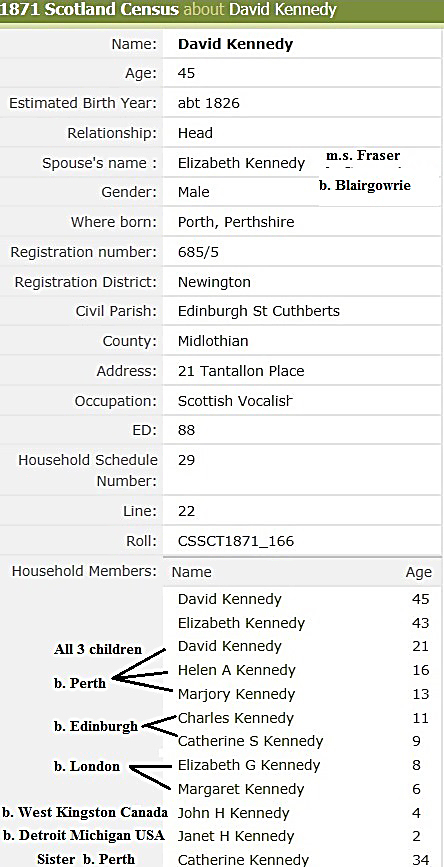
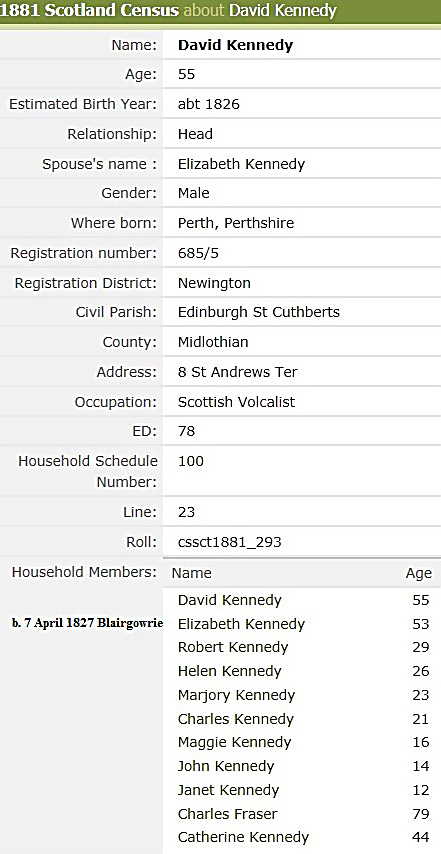
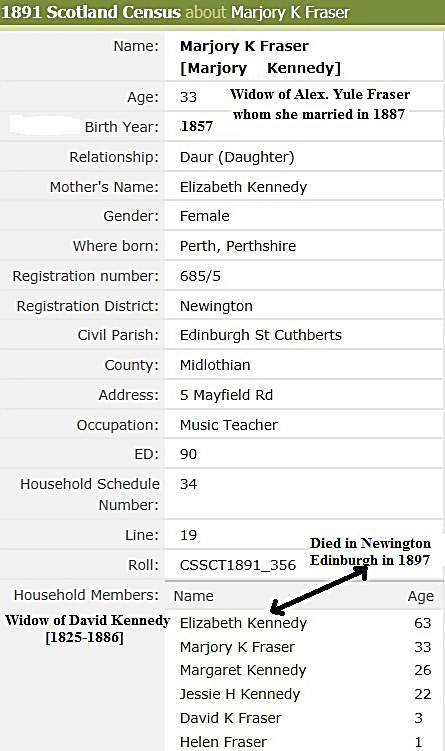
Now, here is the book ...
'Reminiscences of His Life and Work'
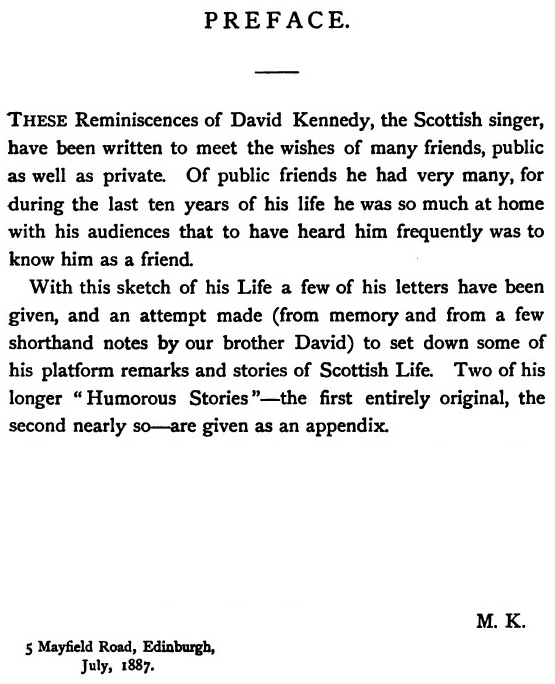
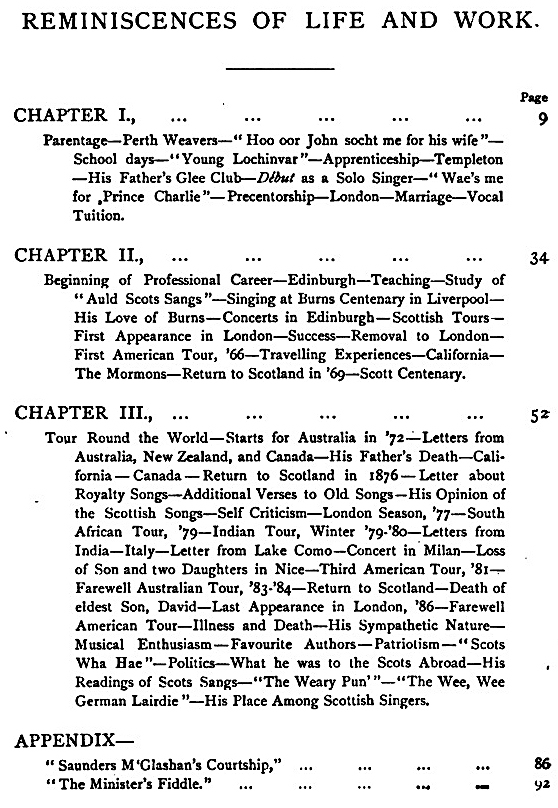
Here are the Chapters in
pdf format
Chapter 1
Chapter 2
Chapter 3
Appendix 1
Appendix 2
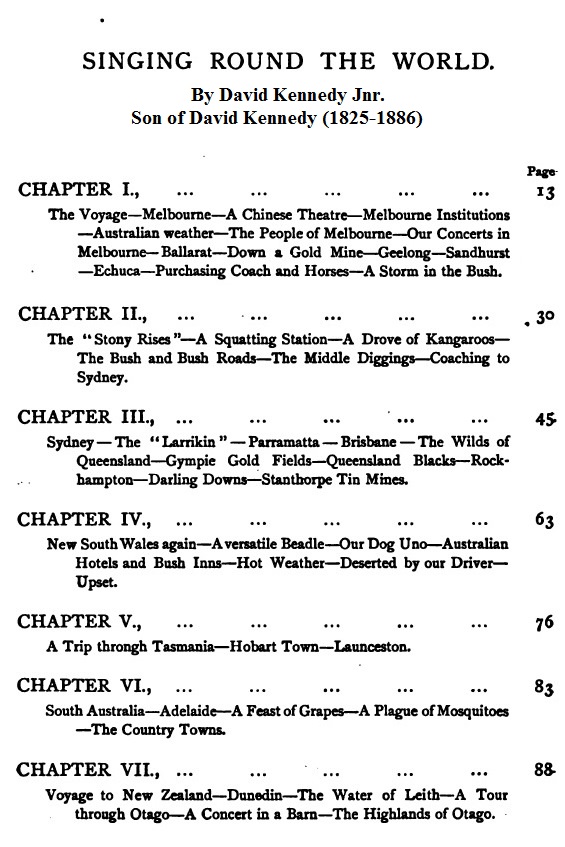
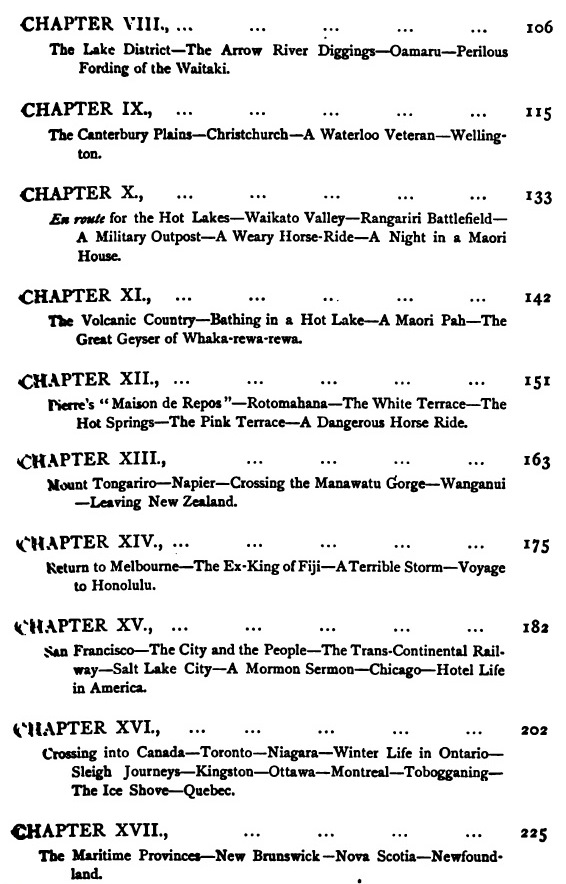
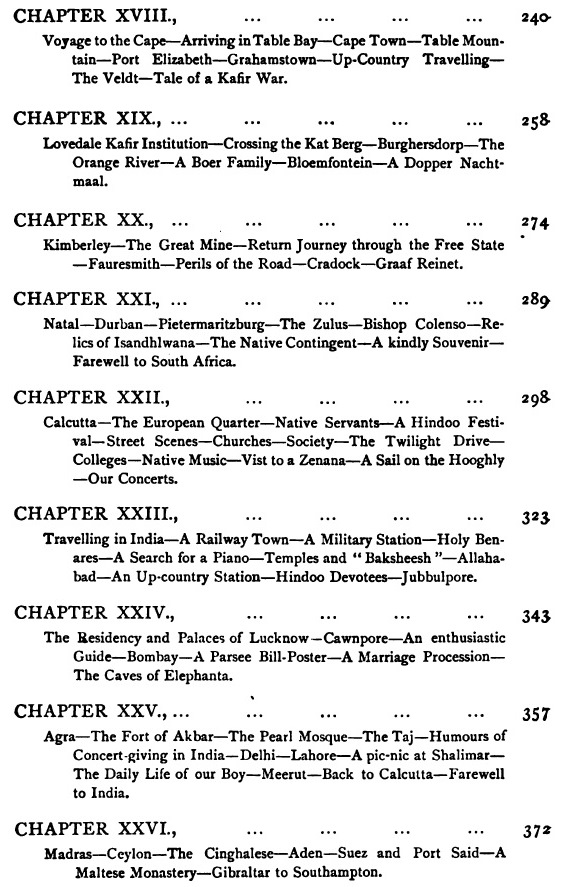
PREFACE
The following pages tell the story of the
tours undertaken by my father during 1872-1880. While not exhausting the
record of his professional travel, this Narrative may be regarded as
representative and complete in that it details what was literally our
singing round the world.
Sailing down the South
Atlantic, round the Cape of Good Hope, we sang three years throughout
the length and breadth of Australia and New Zealand. Then voyaging
across the Pacific, via the Sandwich Islands, we performed a
considerable tour in California. Journeying over the Transcontinental
Railway, and singing a week among the Mormons, we began a Canadian
campaign which lasted an autumn, winter, and spring. Then, after a
series of concerts in outlying Newfoundland, our faces were at length
homeward turned across the Atlantic. In February of 1879, amid the
excitement and anxiety attending the disastrous opening of the Zulu War,
my father sailed for South Africa—the tour comprising Cape Colony, the
Diamond Fields, and Natal. After returning to Scotland for only a brief
ten days’ rest, we set out for a six months’ tour of India, singing the
Songs of Scotland at Parsec Bombay and Hindoo Calcutta, amid the scenes
of the great Mutiny, and as far north as the Punjaub. The wanderings
thus sketched form the subject of this book.
Some years previous to
these excursions, however, my father had paid his first visit to Canada
and the United States, and had also sailed from New York to California
via the Isthmus of Panama, an interesting if somewhat anxious
undertaking in those days. It chanced that he was invited to assist at
the San Francisco celebration of the opening of the Transcontinental
Railway, and was among the first to travel over that extensive line—a
journey otherwise memorable to him from the fact that en route he had an
interview with Brigham Young.
Simply as a tale of
travel, this book may have a raison d'etre in describing arduous and
adventurous routes, performed by means of primitive conveyances, amid a
condition of things which has disappeared or is fast disappearing from
the Colonies. As a record of concert tours, it chiefly recounts such
incidents as were more peculiar to the countries through which we
journeyed. Our travelling party consisted of my father; my sisters
Helen, Marjory, and Lizzie; my brothers Robert and James, and myself. I
must not forget to mention my mother, who shared with us in our
pleasures and toils, and who, though not publicly taking part in our
professional life, contributed so much to our comfort and happiness
during our years of travel in these far-off lands. The charm to us of
these wanderings consisted in the fact that, journeying as a family, we
could as it were carry with us "our ain fireside."
David Kennedy, Jun.
Here are the
chapters in pdf format
Chapters 1 - 5
Chapters 6 - 10
Chapters 11
- 15
Chapters 16
- 20
Chapters 21 - 26
I found this book of his Scottish Songs in
pdf format but it was a bit of a mess so I unpacked it and edited each
page and recompiled it back into a pdf file. It's about 53Mb in size as
due to the quality I was a touch concerned about trying to reduce the
size. You can download the book by clicking on the link under the title
page.
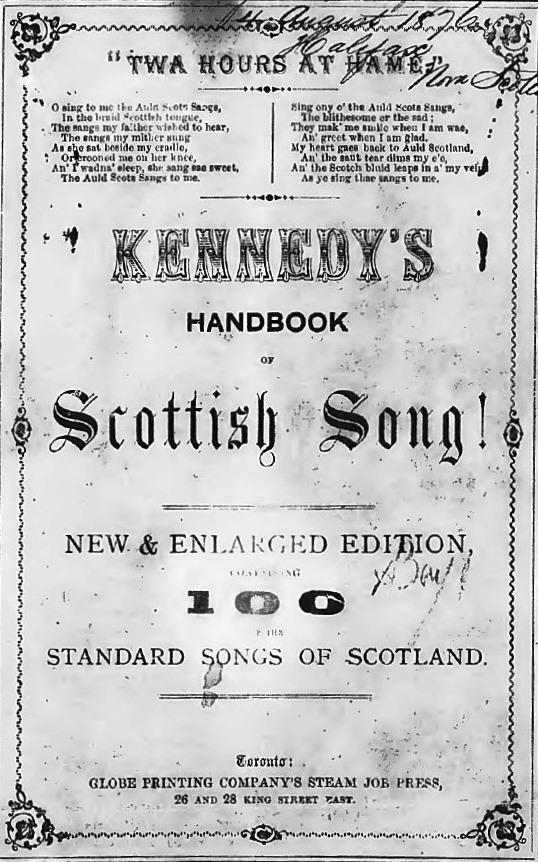
Kennedy's
Handbook of Scottish Songs
John Henderson found three old recordings of
these old song and sent them in for us to add to this page for which
many thanks.
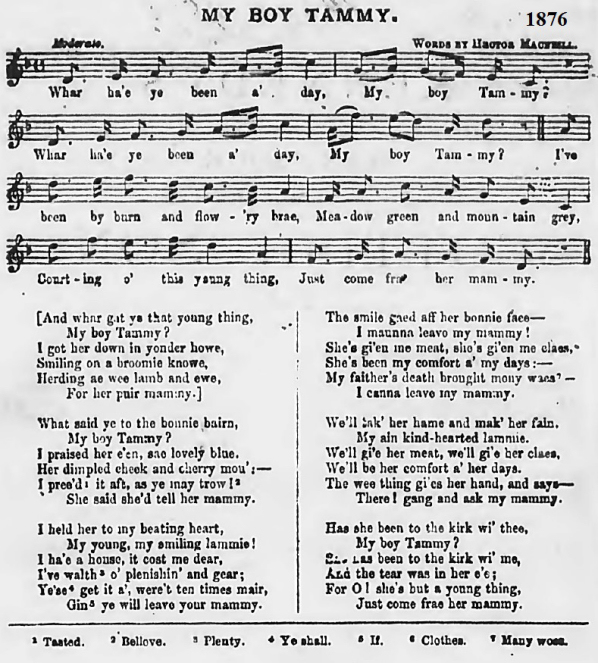
Click here
to listen to this old song
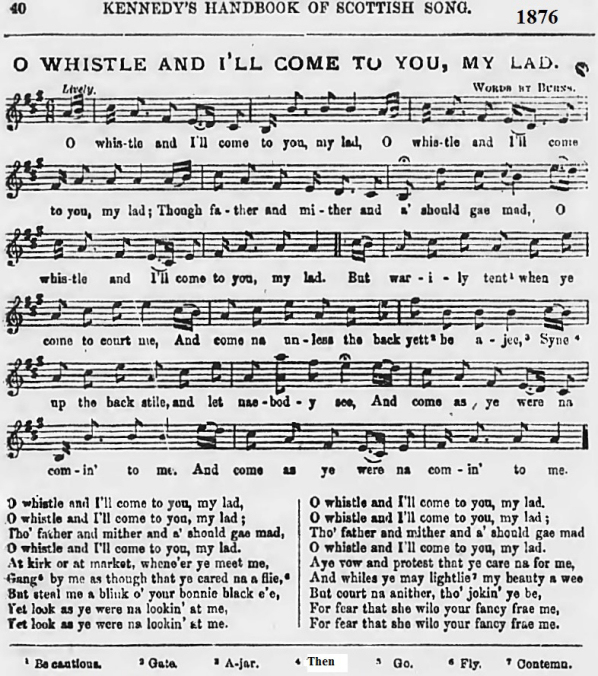
Click here to listen to this old song
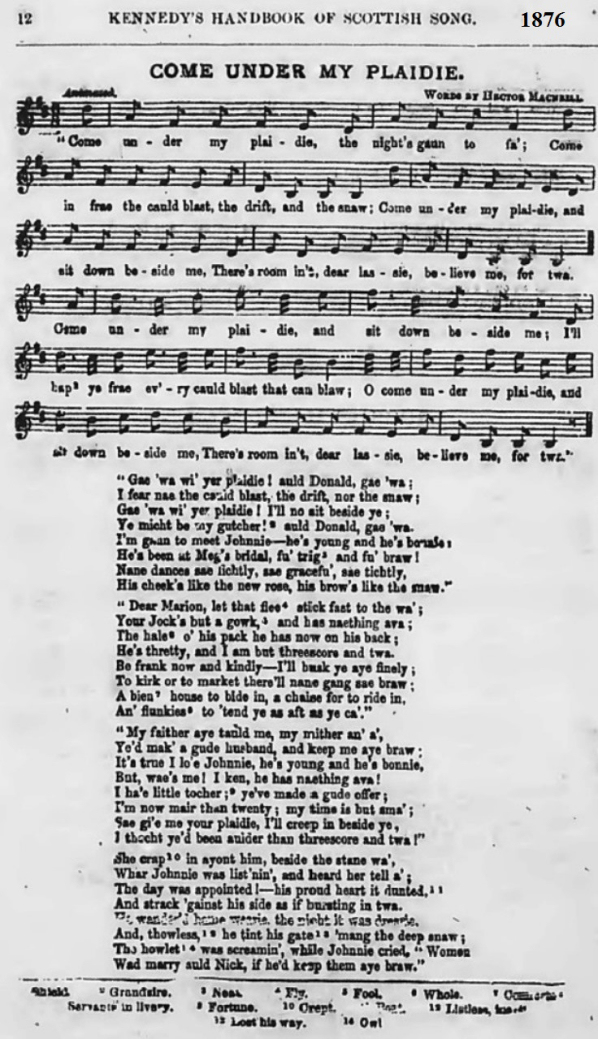
Click here to listen to this old song
Superb eulogy for
David Kennedy ….. by an ex-pat Scot – Thomas Laidlaw of Toronto
IN MEMORY OF DAVID
KENNEDY,
THE DISTINGUISHED SCOTTISH VOCALIST.
Died at Stratford, Ontario, October 13th, 1886.
By Thomas Laidlaw
Tonight we lift the minstrel harp,
With tears of sorrow wet,
And strike with reverent hand its chords
To wailings of regret.
We strike in numbers sad and low,
And dirgeful notes prolong ;
We mourn to-night for one who reigned
A prince of Scottish song.
His songs were fragrant with the breath
Of broom and heather bells,
They echoed to the murmuring streams
And music of the dells ;
He brought auld Scottish scenes to view,
As if by magic wand ;
We loved him ! O, "a nicht at hame"
With Kennedy was grand.
The sighs and vows that lovers breathe
Were sacred in his hands,
He wove them into garlands rare.
Entwined with vestal bands ;
And honest worth more noble seemed,
As with exultant swell
He sang how independent minds
All other minds excel.
With all the bearing of a prince
To front with battle brought.
He grandly sang of honoured fields
By Scottish valour fought.
He held us, as he seemed to rend
Tyrannic chains with scorn,
And led us with him as he soared
On wing of freedom borne.
He sketched the lore of Scottish song ;
With true perceptive art ;
His stories, with a wondrous power,
Revealed the human heart.
Now tender, pawky, shrewd and wise.
Anon with humour rife.
As told by him with unction rare,
Were true to Scottish life.
His voice had stirred the flagging soul,
And rapturous plaudits won
In every clime, in wintry zones.
Or 'neath the tropic's sun.
And in our land, whose shores again
His welcome foot had prest,
Expectance reigned in every heart,
The heart to joy confessed.
Alas for hope ! within yon room
The Scottish minstrel lies,
Where weeping friends close round his bed
And breathe their burdened sighs.
Hand clasps with hand, in kind farewell,
Lips tender words convey,
While soul-lit eyes with touching glance
Say more than words can say.
He breathes a wish to hear that hymn,
"The Rock of Ages cleft,"
Friends in that deeply solemn hour
Their trembling voices lift.
The dying minstrel feebly joins.
Yet sings in faith and love,
Yet while he sings, his spirit soars
To sing the song above.
Yet though on earth his voice was hushed,
And on a foreign strand,
His dust is in the auld kirk yard
And in his native land ;
Amid the scenes of which he sang.
Of which he was a part.
Where on his grave the lark doth rain
The music of its heart.
Ye autumn winds that drift the lea
With heavily burdened sigh ;
Ye limpid streams that gently flow
Beneath a leaden sky,
In concert sing with muffled voice,
And join ye woodland throng
In liquid notes, for one who reigned,
A Prince of Scottish song.

